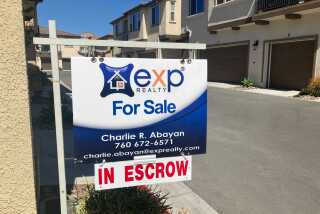Zero-Down Loans Tried on Pilot Basis
- Share via
WASHINGTON — Could that most traditional and substantial cost of buying a home--the mandatory down payment--go the way of the dinosaur?
Could credit-worthy families in large numbers routinely purchase homes with not a single dollar out of pocket, even if they’re rolling in dough and simply prefer to invest their cash elsewhere?
Draw your own conclusion: The two largest mortgage institutions in the country--Freddie Mac and Fannie Mae--quietly have been financing loans with zero down payments on a pilot basis for months. Freddie Mac even plans to announce a full-fledged, national nothing-down mortgage program as part of its regular loan menu later this fall.
That, in turn, would open the possibility of zero-down-payment mortgages to vast numbers of borrowers of any income level--the well-off or those just scraping by.
Although Freddie Mac says the final details of its full-scale program are still being worked out, the company confirms that it has been selectively purchasing zero-down-payment mortgages up to $252,700 on a “negotiated” basis from large lenders. Fannie Mae officials confirm they have been doing the same.
Executives of both companies say the nothing-down loans all have been made to borrowers with excellent credit profiles, and all carry private mortgage insurance designed to cover Freddie’s and Fannie’s heightened risks. Some, but not all, loans have come with slightly higher interest rates or fees compared with conventional mortgages.
What’s really going on here? Isn’t a down payment--even of modest size--an essential component of any mortgage? Doesn’t a home buyer demonstrate a commitment to paying back a mortgage by investing his or her hard cash? And isn’t it a statistical fact that home buyers with little financial stake in a property are far more likely to default on payments and go to foreclosure?
Likelihood of Default Easier to Predict
The answers have gotten complicated over the last few years. For starters, Freddie, Fannie and the mortgage insurance industry have developed highly sophisticated credit analysis software that can predict the likelihood of default far more accurately than anything they’ve had before. The software uses not only credit-scoring technology, but also blends in economic data about the market where the house is located.
Armed with better risk-evaluation tools, mortgage insurers and lenders have become more confident that they can bend the traditional rules on down payments, and finance borrowers who would have been rejected instantly earlier in the decade.
A spokesman for one of the big insurance firms actively working in this field, Geoffrey Cooper of MGIC Investment Corp., says, “It’s amazing, isn’t it--a $250,000 mortgage with nothing down?” But that’s precisely what’s already quietly available to applicants with top credit histories.
Another large mortgage insurer, United Guaranty Corp., said that it underwrites loans as high as $334,750 with zero down payments.
Though Freddie Mac’s program won’t go that high, company officials say it could require that purchasers have resources on hand--either their own or a gift--to pay closing costs of 3%. Zero-down loans Fannie Mae has purchased recently come with the same requirement.
Could a zero-down home mortgage be in your future? That depends on whether you could qualify on credit quality, and whether nothing-down makes sense for you financially.
Neither Freddie nor Fannie would discuss specific credit standards they use, but mortgage insurers involved with both programs said that the typical minimum credit score for a zero-down loan is a 700 FICO. FICO stands for Fair, Isaac and Co.’s ubiquitous credit scoring software that ranks likelihood of default numerically from about 400 to 900, based on analyses of credit files. Generally, a FICO score of 700 or more is considered an excellent risk. Below 600, borrowers are considered “sub-prime” and represent progressively higher risks.
Another consideration in zero-down loans: The more you borrow, the heftier your monthly mortgage payment. On top of that, all zero-down loans entail private mortgage insurance with deeper “coverage” that will increase your monthly payment.
But think about the possibilities. Say you’re a small-business owner with a solid income and good credit. You’ve got cash in the bank you could use for a down payment. But you know that it will earn more if you invested it in your business than in your house. A zero-down mortgage would make a lot of sense for you.
Dispensing With the ‘Starter Home’ Phase
Or say you’re young, just starting out in your career, recently married but with almost no cash on hand. A zero-down option could get you into the house you want now, rather than down the road.
Traditionalists may shake their heads and worry about zero-down. But the insurance and credit score developers say there’s nothing sacred about the down payment, and they’ve got the added risk covered.
*
Distributed by the Washington Post Writers Group.
More to Read
Inside the business of entertainment
The Wide Shot brings you news, analysis and insights on everything from streaming wars to production — and what it all means for the future.
You may occasionally receive promotional content from the Los Angeles Times.










